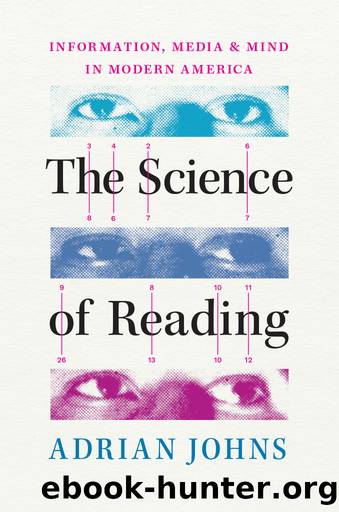The Science of Reading by Adrian Johns;

Author:Adrian Johns; [Johns, Adrian]
Language: eng
Format: epub
Tags: SCI000000 SCIENCE / General, SCI034000 SCIENCE / History, LAN010000 LANGUAGE ARTS & DISCIPLINES / Literacy, HIS037030 HISTORY / Modern / General
Publisher: University of Chicago Press
Published: 2023-03-09T00:00:00+00:00
7
Exploring Readers
On May 4, 1960, Samuel Renshaw entertained a special guest at his laboratory in Columbus. His visitor was on sabbatical from his regular teaching position at the University of Toronto and was devoting his year of leave to a mission. The president of the National Association of Educational Broadcasters, Harry Skornia, had sought him out after he had made a string of provocative and enigmatic statements at various venues in Canada and the United States about how changing media intersected with social and cultural transformations. Skornia had asked him to compile a report on that topic, which might then be used to prepare syllabi suitable for eleventh-grade courses in American schoolrooms. It seemed self-evident that in fulfilling that charge he should pay a visit to the man who claimed to be able to use media technologies to drastically speed up perception, extend human capacities, and unify the senses.
Marshall McLuhan was not yet the famous media prophet that he would become, but he was well on the way there. The first recorded instance of his using his most notorious phrase, âthe medium is the message,â had taken place a couple of years earlier, in May 1958.1 McLuhan had been participating in a conference in Vancouver on the future of radio broadcasting, alongside Paul Lazarsfeld, Wilbur Schramm, and an array of experts from the Canadian, US, and British systems.2 The event was one of an ambitious multiyear series at the University of British Columbia to rethink media in general; the following year McLuhan would return to teach a summer school. Technical questions were to be treated alongside more academic, âtheoreticalâ themes, and administrators hoped the combination would make UBC into Canadaâs âmajor centre for the study of communications.â Never one to observe stuffy intellectual conventions in any case, McLuhan took the hint and spoke expansively about media in general. As a result, when he voiced his famous motto, he was not talking at that moment about a new medium at all. He was not even talking about radio. He was talking about printâand the significance of print, he announced, lay in its enabling of people to read in a particular way. By allowing people to read silently and âat high speed,â print had given rise to âa totally new set of mental operations.â That was why âthe medium is the message.â3
To read silently and rapidlyâin coining his motto, McLuhan picked up the two major and perennial themes of the science of reading. He liked the phrase that this inspired from the start. At the end of the Vancouver meeting, he flew to Washington, DC, and repeated the same point to an audience interested in education and television. âWe should long ago have discovered that the medium is the message,â he told them: âThe effect of reading is far more decisive than anything that gets said from moment to moment on the page.â Indeed, he went on, the page itself was not âa conveyor belt for pots of messageâ but âa producer of unique habits of mind.
Download
This site does not store any files on its server. We only index and link to content provided by other sites. Please contact the content providers to delete copyright contents if any and email us, we'll remove relevant links or contents immediately.
Enlightenment Now: The Case for Reason, Science, Humanism, and Progress by Steven Pinker(7306)
A Journey Through Charms and Defence Against the Dark Arts (Harry Potter: A Journey Through…) by Pottermore Publishing(4811)
The Immortal Life of Henrietta Lacks by Rebecca Skloot(4581)
A Journey Through Divination and Astronomy by Publishing Pottermore(4382)
Elon Musk by Ashlee Vance(4122)
Origin Story: A Big History of Everything by David Christian(3688)
COSMOS by Carl Sagan(3618)
Alchemy and Alchemists by C. J. S. Thompson(3516)
Bad Pharma by Ben Goldacre(3422)
Enlightenment Now by Steven Pinker(3367)
Shadow of Night by Deborah Harkness(3361)
Inferior by Angela Saini(3311)
A Mind For Numbers: How to Excel at Math and Science (Even If You Flunked Algebra) by Barbara Oakley(3302)
Origin Story by David Christian(3195)
The Code Book by Simon Singh(3182)
Signature in the Cell: DNA and the Evidence for Intelligent Design by Stephen C. Meyer(3132)
The Elements by Theodore Gray(3051)
A Brief History of Time by Stephen Hawking(3022)
A Journey Through Potions and Herbology (A Journey Through…) by Pottermore Publishing(2852)
